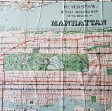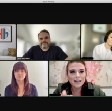My Journey to Literacy Began as I Was Preparing to Graduate From College
The last time someone had placed a physical book in my hands had been 16 years earlier, when I was six years old and in the second grade. When Tiffany handed me a tattered copy of “The Autobiography of Malcolm X” and strongly suggested I read it, there was a sense of care that accompanied the gesture that made me take it seriously.
The experience still feels like an intentional threat meant to cause me harm, at the very least to demean me. One act placed me in literal bondage, while the other freed me to enjoy a life inside of books and the words and worlds they behold.
As far as I know, Tiffany is still the wife of my second college roommate, Eric. They no longer use their birth names after choosing Islam as a way of life. Before their conversion, we were typical college students sharing a two-bedroom condo on the border of our campus. Except Eric and Tiffany, who dated since high school and came to college together, were more mature in all ways.
I was at least three years their senior but had just started my fight toward academic, financial, and relationship success. Both of them had known me and watched my slow progression, even before Eric and I became roommates.
You never know who is paying attention or the impression you leave on them. Clearly, my lifestyle over the years suggested to Tiffany that I had finally reached a place where I would appreciate her help.
Tiffany could not have known that at 22 years old and preparing to graduate from college after five years, I struggled to read nearly my entire life. I could manage, clearly, but I would never read aloud, and it would take me an enormous amount of time to read anything.
Most of my academic success was the result of three factors: I was a very attentive listener and learned well through visual examples and lectures; I learned to copy just about anything and writing or copying translated well for me; and finally, I could talk my way into or out of just about any situation.
I had been selling something to somebody since the age of nine when I started my first door-to-door business. Talking a teacher, instructor, or professor into a passing grade or out of failing me was far easier.
During my 16 year struggle with literacy, there were a handful of teachers who made it known to me they were aware of my challenge. The few who cared helped me gain access to the subjects they taught by finding other ways to motivate me or allowed me opportunities to complete assignments in ways that were more comfortable for me.
In high school, Coach Wendt taught American history, and probably why I enjoy learning all histories today. He first recognized that I could almost recite his lectures verbatim, based on whatever I copied in my notebook from his chalkboard outlines. He decided to challenge me to earn my first A in his class by agreeing to do 50 pushups with me sitting on his back.
There was zero motivation in his offer. I did not care how strong Coach Wendt was. What moved me was that a man cared enough to single me out and plant the belief that I could excel in his class. It was a first in many ways.
Another example was Mrs. Jones, the only teacher I ever had a serious crush on. Mrs. Jones taught my final English course in high school. If it had not been for her, I would not have graduated or attended college.
She would allow me to stay after class often, read the instructions for various assignments to me, work with me one on one with difficult vocabulary, and taught me sight words. She would also allow me to deliver my book reports orally without an audience.
As it was with book reports, I never actually read an entire book. I would skim enough pages to get a feel for the material, then make up the rest of the story using my imagination. Mrs. Jones seemed to be entertained by my stories, which made it fun for me to be creative. It was another first in many ways.
I was accepted into college, but on a provisional basis, because my writing and verbal test scores were so low. However, my math scores were apparently above average. The condition involved me having to take remedial reading and writing courses for the first two semesters.
Dr. Thelma Thurston Gorham was the instructor, and I learned a different tactic to pass her courses. I became one of the biggest troublemakers during my first year. It was completely out of character for me as I had been reared to respect all elders, especially teachers.
My mother had been a public school educator most of my life, including a librarian, director of the gifted and talented program, and a school administrator. Most of my school administrators would call my mother if I even hinted at getting out of line, so I never disrespected a teacher. Well, I never blatantly disrespected a teacher or was caught being disrespectful.
There was no one to call once I entered college, and Dr. Gorham received the consequences. I acted the way I did out of unrecognized fear. She required each of the students in her small class to read aloud in the first week. I wonder if it was her way of assessing our skill level or lack thereof.
I lost it that first week. Once I saw that her reaction was to skip past me for the outburst, I continued the tactic the entire semester. It was a pass or fail course, so I did the bare minimum to pass.
I attempted the same the following semester in her writing course, to no avail, as she mainly required personal essays. Dr. Gorham was the first to tell me I had a gift for writing. I never believed her, then, but the words stuck with me.
Ironically, five years later, after reading “Malcolm X,” I found Dr. Thelma Thurston Gorham, apologized for my behavior, and asked if she would tutor me in reading and writing. She remembered me, was pleasantly surprised, and agreed to help me if I was serious. We never had the opportunity to begin. Dr. Gorham passed a few months later.
It is important to understand how I became frozen at a third-grade reading level. During the fall of second grade, I moved to Gainesville, Florida, to live with my mother and her fiancé.
My mother and biological father divorced when I was five years old and in first grade. Once the school year ended, my younger sister and I moved in with our maternal grandmother, while our mom left to prepare a home for us near where her fiancé lived.
I began second grade at Leonard Wesson Elementary School (“LW”) on the south side of Tallahassee, Florida. It was located in a mixed-race community, but I remember the school being predominantly Black.
Before my parents’ divorce, we lived in the Holyfield Apartments on Texas Avenue, which was 100 percent occupied by Blacks gentrified from an area known as the “Bottoms” to make room for the city’s civic center.
All of the children in Holyfield attended LW, and we walked to school together, unless you were fortunate enough to have a bicycle. Then you rode ahead. I attended LW with the other residents from LW since kindergarten.
In the first grade, I began to notice white students, or at least that is my earliest recollection. And it was not worthy of a lot of fanfare. It was not as if neither of us had ever seen the other race before.
Although the apartments’ residents were Black, those who lived in the houses bordering the complex were white. Interestingly, we had to walk down their street to reach the school.
But I never once considered where these children attended school. I did not see color as a point of contention until much later in my life, something my reading of “The Autobiography of Malcolm X” would help me reconcile.
Once my mother settled in Gainesville, my younger sister and I asked to be with her. However, my mother wanted me to finish the school year at LW first. My sister had just turned three, so school was not a concern for her. My sister and I continued to protest about being left behind and eventually won. We moved to Gainesville, too.
I was excited to move to a new city, neighborhood, and school. Mostly, I was excited to be reunited with my mother. I loved my grandmother, who I had already spent more than half my life with. But I really wanted to be with my mother.
Our mother had accepted a position as a school librarian in Newberry, a neighboring rural community. Instead of enrolling me in my zoned elementary school, Lake Forest, to complete second grade, our mother took my sister and me to Newberry with her and put my sister in daycare.
I was dropped off at a caretaker and walked to school with the kids in that neighborhood, which was exactly what I was used to. My mother’s decision for me to attend Newberry’s elementary school had to, in part, be because I had never ridden a school bus and did not know anyone in our new neighborhood.
I wonder if my mother wanted to limit the number of transitions and new environments I would have to experience. Besides, there would be no one available to make sure I boarded the bus on time or to meet me once I returned to the community on the bus. It also likely made sense for me to be close to where my mother worked so my adjustment would be easier.
The school in Newberry was nearly the complete opposite of LW. Because all grades were located on one huge campus, you would see kids of all ages walking to school. There was also a clear distinction between neighborhoods based on race alone, divided by the railroad tracks. The school campus was on the white side of the tracks.
However, the most significant difference was the majority group of teachers and students shifted. LW was mostly Black in both regards. Newberry was mostly white, and its staff and students appeared to still be uncomfortable with racial integration, at least in the eyes of a second-grade newcomer to their community. The school environment was hostile.
Very early on in our insulated second-grade classroom, I was singled out to read aloud. It was the first time I would stand before a class and with relative strangers. I froze, then began to stammer as I tried to read while nervously watching for the reactions in the room.
The teacher quickly became frustrated and sat me down. I am not sure if the action immediately following was sending me to a remedial reading instructor, but that is where I ended up. My problem worsened at that point. If being afraid to read in front of a classroom of peers was difficult, the next room would be impossible. The remedial lab was in the library, where my mother was the librarian.
I felt horrible for both of us. It seemed both of our reputations were in my hands, and it was too much pressure. My best guess is that my reading level froze at that point.
It seems I did whatever was possible to avoid reading after that time. The thought of reading would cause a negative physical reaction in me that took a tremendous effort to mask and years to overcome. I now know this is called post-traumatic stress disorder. Then it was just highly uncomfortable and seemed only to be resolved through avoidance. I had managed to avoid my issue with reading until Tiffany gave me that book.
I cannot tell anyone why I chose to engage with “The Autobiography of Malcolm X” rather than put it aside as I had done with so many other books. It is plausible that it was the person who gave it to me, but Tiffany and I had a cordial relationship at best.
I admired, no envied, the way she loved my roommate and friend, Eric. But I understood that they had grown into young adulthood together, and my appreciation for her was purely platonic. They were best friends as well as lovers. Still, I was endeared to her for the way she cared for my friend.
My recent exposure to Islam and the teachings of the honorable Elijah Muhammad may have been a larger reason why I was interested in the book. But attributing full credit to that would have seemed strange and felt inadequate as I had stopped attending the weekly classes held next door to my unit, in my friend and neighbor Deon’s home, years earlier.
The tenets of Islam were intriguing, and the practices helped me maintain a more healthy lifestyle, most notably in my dietary choices and routine monthly fasting. However, I could not embrace its racial exclusivity.
What I know for sure is that I sat down, alone, and started reading from the front cover of the paperback copy of the book and did not stop until I reached the back outside cover. It would become the very first book I would read from cover to cover, literally. Of course, it did not happen in one sitting or quickly at all. It took me weeks to manage the text, but I completed it.
As I read about the transitions of Brother Malcolm’s life, I began to embrace my own. We first connected in the early pages as he talked about the shifts his family made when he was a child when his parents sought to follow Mr. Marcus Garvey’s teachings.
I thought about my own geographical shifts as a child. When he shared the experience of losing his father to violence, then his mother to what was presumed to be mental illness, I was hooked.
My biological father is thankfully alive and well, but was absent for most of my rearing all the same. My mother felt removed at times, not from a mental decline but from the strain of managing a full-time career and pursuing advanced degrees, all while heading a household with two young children. I wondered if my mother’s emotional journey caused a similar outcome — an inability to be mentally and emotionally available for her children.
When Brother Malcolm moved to live with his aunt, I thought about my time living with my grandmother during the early years of my life and most summers. I connected deeply with Brother Malcolm as it was the first time a person’s printed words became visible to me. I could see myself in each of the scenes he recounted, as well as feel the emotion.
Each iteration of his journey drew me in deeper. I was not as involved in the streets or crime as Brother Malcolm was, but I could understand what those associations meant to him. I, too, had associated with people who lived a criminal existence.
Even his journey with fashion and conking his hair resonated with me. I read the book shortly after I had stopped texturizing my own hair and went through a loud colored rayon phase.
But it was his jailhouse transformation that sold me on his story. First, the account of Brother Malcolm sitting with a dictionary to learn the use and meaning of words captivated me. I had tried this before when I met a college administrator who had the most expansive vocabulary of anyone I ever met.
He would use words I had never heard of in regular conversation. His administrative assistant was somewhat of a friend to me and happened to be a very attractive, slightly older lady, so I checked in on her often. Once, I asked her to explain his use of words, and she shared that he routinely read and studied the dictionary.
I thought that was the funniest thing I had ever heard and could not control the burst of laughter that resulted until I noticed she was not laughing. If this man could capture the admiration of a beautiful woman like her, I had to, at the very least, try to expand my vocabulary. It was a short endeavor.
Because I had just been introduced to Islam through the same branch responsible for Brother Malcolm’s teaching and transformation, it was easy to connect with that part of his story. I especially appreciated that he was not selfish with the knowledge he gained. We often share our destructive habits with our acquaintances but feel embarrassed to come back after making positive adjustments.
Brother Malcolm had the same zeal, if not a greater one, for sharing the life that saved him from the streets as he did for the things that led him to incarceration. I was convicted because I had never reached back to pull any of my friends up, although I stood on most of their shoulders just to even remain in college.
But, more than anything else, it was Brother Malcolm’s awakening once he participated in a ritual Hajj that carried me through the end of his journey and cemented the book as an all-time favorite of mine to this day. The very awareness that race was an American construct that religion could transcend and overshadow validated my decision to abandon the study I had begun with leaders that still held on to old segregationist views. I knew too many examples of good people of all races and classes and creeds to condemn one particular faction.
In the end, the book left an indelible impression on me. More so, I wondered if this book opened my eyes to a new world, how many other worlds had I been robbed of from avoiding books. I sought to avenge my missed opportunities by reading anything I could, even if I did not enjoy the material. I read for vocabulary as well as entertainment.
I owe Tiffany the most profound depth of gratitude, as well as Brother Malcolm and his co-author Alex Haley. Likely, I would have found another way into literacy. But I am grateful for the events in that period of my life and the book that inspired my journey into proficient reading. And a life with context.
Clarence White III is a proud father to two young adult sons, pastor of St. Paul United Methodist Church in Galveston, Texas, and a commercial banker. When he’s not walking his pit bull, Dutch “Fantastic” White, or working out at the gym to burn off his favorite Greek and Mediterranean dishes, you can find him at his computer keyboard turning words into inspiration. Clarence recently completed work on his first book, a memoir, about the experiences that led him to become an absentee dad to his firstborn son. These days, he loves nothing more than conversing and spending time with his children, deepening their understanding of the past to build a stronger relationship with them now and for many tomorrows to come. Follow Clarence on Instagram, Twitter, and LinkedIn.





